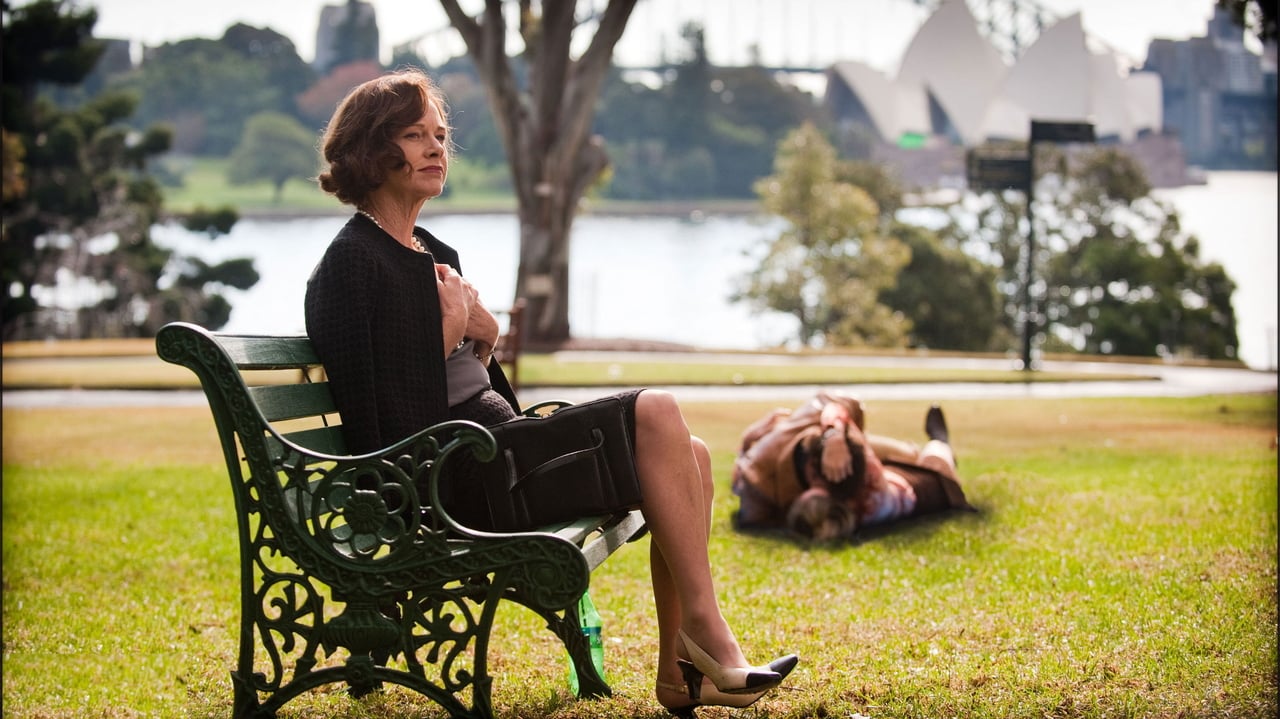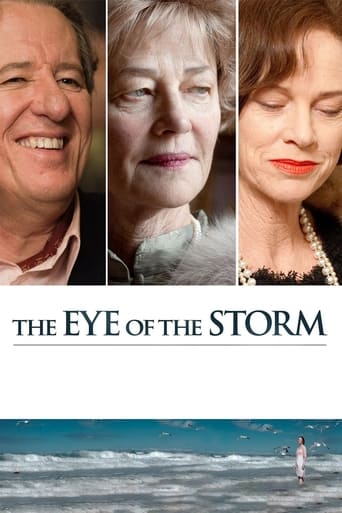Exoticalot
People are voting emotionally.
ChanFamous
I wanted to like it more than I actually did... But much of the humor totally escaped me and I walked out only mildly impressed.
Sameer Callahan
It really made me laugh, but for some moments I was tearing up because I could relate so much.
Taha Avalos
The best films of this genre always show a path and provide a takeaway for being a better person.
percyporcelain
Alright so it's a little 'literary' and the 70s it is ostensibly set in are a little wobbly (it's like you have to remind yourself periodically it's not contemporary), but this unusual family drama is full of surprises and twists as well as a rich and rewarding script that exposes and confronts all the petty squabbles and festering resentments of many a family, and which typically come to a head when a patriarch or matriarch (in this case, Charlotte Rampling) is on the way out. She is serene and strangely humorous, as if she's made her peace and has new insight, while children Basil (Geoffrey Rush) and Dorothy (Judy Davis) continue to clash egos, because both of them have them in spades! The kind of film you can revisit and probably find more each time.
leonblackwood
Review: I found this movie to be really slow and pretty boring. The storyline wasn't that amazing but the acting was quite good. I must admit, I did struggle to find anything that interesting with the film and I did struggle to stay awake. By the end of the film I was left feeling quite empty and dissatisfied which is a shame because I usually like Geoffrey Rush movies. I didn't really know what to expect from the film so I wasn't that disappointed. At nearly 2 hours long, I was expecting something amazing to happen, but nothing really did. Disappointed!Round-Up: Judging by the money that this movie made, it's obvious that I am not the only person that found this film to drag. I was hoping that movie was going to take a different direction, but it stays uninteresting and in some ways, quite boring. Geoffrey Rush does make the movie slightly more watchable, but he wasn't able to save the film.Budget:N/A Worldwide Gross: $84,000I recommend this movie to people who are into there drama's about a lady whose on her death bed, surrounded by her son and daughter. 2/10
busta rimes
I can't see anyone under 50 even being remotely interested in this "Patrick White In Drag" type film (to quote another IMDb user). The 2 hours reminded me of those hours spent in non air- conditioned portable classrooms (for me, in the late 60's) wading through arcane English literature classes wherein Patrick White was regarded as "worthy"...or "significant"."Storm" has all the features we have come to expect from "quality" Australian film-making - a great cast, polished direction, impeccable production values etc etc ... but it's as dull and disconnected as the world White writes about. Who really gives a stuff about an imploding grazing family presided over by a a dying monster ... nominally set in the 1970s, but really (as in most of White's writing) set in the 1930s? On a $15m budget ... it probably needs a world wide gross of $100m to break even. Ye Gods - who green-lit this? How much Government funding went into it? (Its $1.6m domestic gross should just about pay for the Prints and Advertising" budget & little more).We have a bustling new generation - make that two generations - of film-makers pushing the envelope and making "Animal Kingdom", "Daybreakers", "Red Dog" etc who seem to be at least aware of their audience and their responsibility for getting a return for their investors. Film-making is an expensive business ... and "Storm" is just a sad old melodrama, outdated, over-priced and isolated from the real world, doomed to fail financially. I can understand why audiences congratulate themselves for having sat through it ("splendid and intelligent" - another IMDb post), but it's just an Anglo middle class statement from people who are longing for the days of "Careful He Might Hear You" or "The Devil's Playground".At least the English Class in those old portables only lasted 50 minutes...
Philby-3
Patrick White put Australia on the literary map by winning the Nobel Prize for Literature in 1973, but his rich dense style did not make for a best-selling author. This film, an adaptation of White's novel, marks the first time anyone has succeeded in filming a White novel, though he wrote the screenplay for a curious piece directed by Jim Sharman, "The Night the Prowler" in 1977. Director Fred Schepisi said at the preview I attended that it was a challenge to film the allegedly unfilmable; if it had been easy it would have not been worth doing. Yet despite the style White was rather a theatrical author, and Judy Morris's screenplay accurately reflects White's mordant wit. His characters are acting their way through life and there is drama in almost every scene.Old Mrs Elizabeth Hunter, widow of a wealthy grazier, is nearing the end of her days in some splendour in her Centennial Park, Sydney, mansion, and her two children have been summoned to her bedside. Her son Basil, once a leading actor on the London stage whose career is now in decline and her daughter Dorothy, the ex-wife of a minor French aristocrat, are motivated more by their possible inheritance than affection for the old lady. In fact Elizabeth inspires more affection in her nurses, solicitor and housekeeper than she does in her children. Dorothy in particular has cause to hate her mother, yet it is she who gets closer to her as the film progresses.Schepisi manages to blend in the dark humour of the situation with the downbeat storyline. The cinemaphotograhy is gorgeous and the cutting, often without the usual establishment shots, wonderfully done, given the extensive use made of flashbacks – you instantly realise where the characters are. The book's interior monologues often appear as a single image in a single screen. The casting is such as Geoffrey Rush mentioned at the preview that he could not refuse – the very best of the Australian acting profession, though the pivotal role of Elizabeth Hunter is played with great panache by Charlotte Rampling. Rush plays Basil as a man who takes himself seriously, but can't persuade anyone else to. Judy Davis simmers as the disillusioned Dorothy , and John Gaden as Wyburd the family solicitor with a skeleton or to in his own cupboard is pitch perfect. Flora the day nurse, played by Schepsi's daughter Alexandra, is vividly realised, and there are good performances in minor roles also, including Helen Morse, unrecognisable, as Lotte the tragic housekeeper, and Colin Friels as a Labor politician on the make rather reminiscent of one Robert James Lee Hawke. The only odd casting decision is casting Melbourne locations as Sydney. Mrs Hunter's mansion is definitely not in Sydney and only a couple of brief scenes are shot in Centennial Park.It has been opined that "The Eye of the Storm" is Patrick White in drag, and it is true that there are some obvious personal aspects to the story - there is a lot of White's mother in Mrs Hunter. Set as it is in the early 1970s in the declining old money grazier milieu, this film could be written off as a period piece. Yet Schepisi has managed to capture both the theme and atmosphere of the novel. The difficulties of dying have rarely been so well depicted on film. This may not be a box office smash, but it will appeal to anyone who likes a solid piece of film-making.

